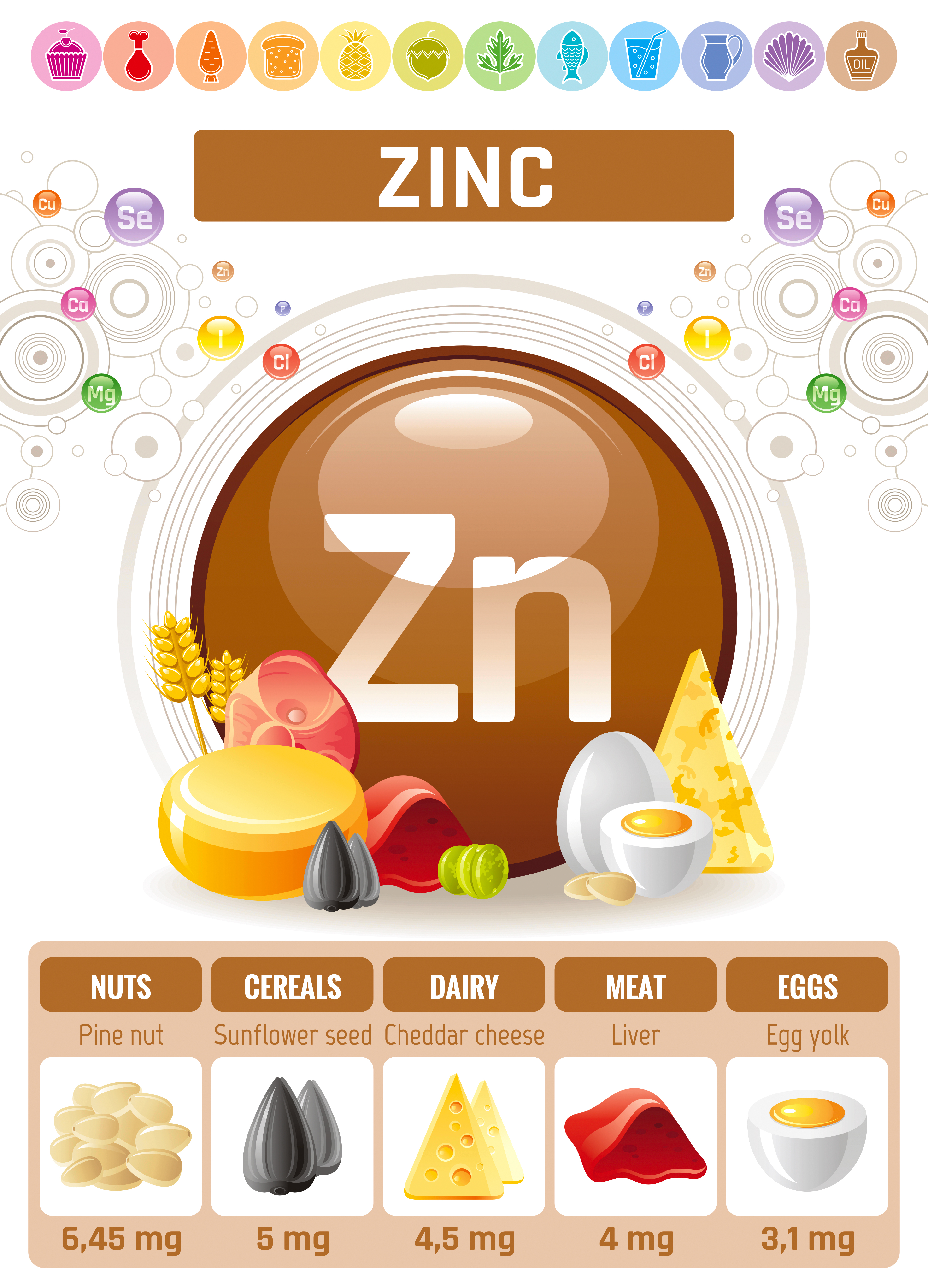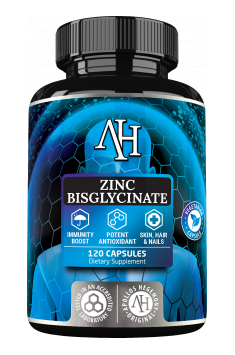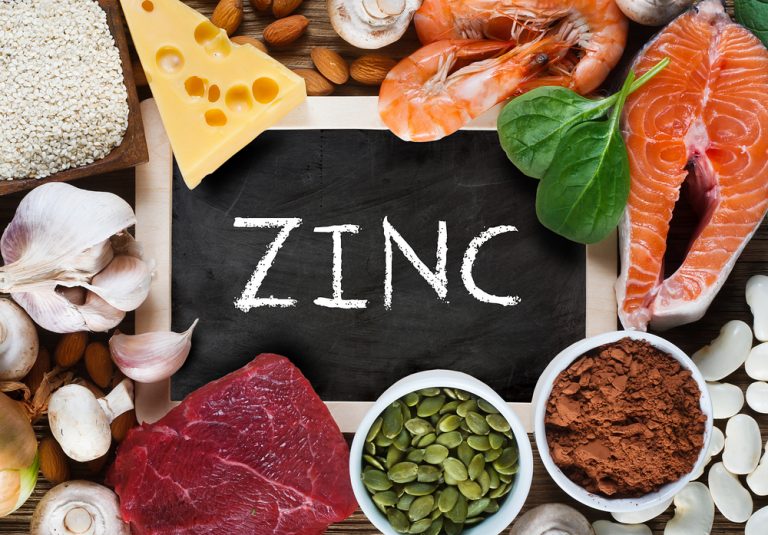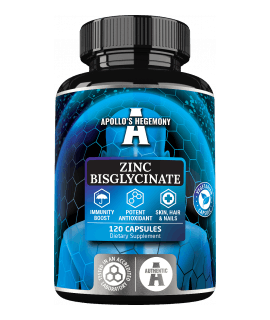Zinc - general information
Zinc is a chemical element belonging to the group of transition metals. This microelement is one of the compounds necessary for survival. It was discovered in China or India before 1500 BC. A well-known compound of this element is ZnO (zinc oxide also called zinc white), which is used in the chemical industry as an additive to paints and varnishes.
Zinc is mainly supplied to our body with food. The most common sources of this element are peas, mussels, nuts, oysters, pumpkin seeds, whole grains, liver and beef.
Zinc actions and benefits
Despite traces of this element in our body (1.5-2.2 g), this compound is important in a number of processes. First of all, it is a component of approximately 80 enzymes that are produced in our body. It is also an essential coenzyme (meaning non-protein component of these compounds) in over 200 types of this compound. Zinc also determines their functionality through participation in such processes as energy production, metabolism of bones, fats and carbohydrates, synthesis and lysis of proteins as well as the production of amino acids.
Zinc, like manganese or copper, is part of one of the major antioxidants of our system - superoxide dismutase (SOD). Antioxidation is the process of protecting cells from free radicals, which contribute to lowering our immunity and deterioration of the body's functioning. In the context of the immune system, it is worth mentioning that the element in question directly affects its activity. We're talking about stimulating the thymus (the main organ of the immune system) to secrete thymulin. This hormone is responsible for the production of T-lymphocytes, which are colloquially called white blood cells. What's more, zinc has direct antiviral properties.
Another important property is the effect of zinc on blood sugar levels. This element is used by the pancreas to produce and secrete insulin. In addition, along with chromium, it determines the use of this hormone by the cells. Another important aspect of zinc is the effect on the use of glucose by the tissues of the eye. The weakening of the metabolism of this compound can lead to pathologies such as cataracts.
Zinc is also an important supplement in the diet of every man. It is not only responsible for maintaining and increasing testosterone levels, but is extremely important in the process of sperm production. It is also worth adding that the activity of this relationship also affects their mobility.
In addition to the above properties, zinc is responsible for:
- acceleration of wound healing and dermal problems like juvenile and rosacea acne, burns, blemishes or psoriasis
- protection against dementia and stimulation of thought processes
- sense of taste and smell
- normal fertility and regulation of the menstrual cycle
- relieving symptoms of peptic ulcer, hemorrhoids, osteoporosis and intestinal inflammation

Zinc - best natural sources of this important mineral
Why you should use zinc?
On the basis of the aforementioned pro-health properties of zinc, it is easy to conclude that it is a compound with multiple applications. The main indications of the use of this element include:
- cold
- weakening of the immune system
- prostate hypertrophy
- a small number of sperm in sperm
- infertility of women
- dermal problems and wounds
- lack of appetite and taste disorders
- cataracts
- diabetes
- disorders of psychomotor excitability with concentration disorders
- hyperactivity
- prevention of fetal development and growth
Zinc deficencies
Zinc deficiency is a very dangerous condition and can lead to a number of pathologies in our system. The state of reduced content of this element is noticeable in people who consume a lot of alcohol, sugar, fiber and products enriched with copper and iron.
The most common symptoms of zinc deficiency include:
- lack of appetite
- dry mouth
- dermatological problems
- reduced libido
- increased susceptibility to bacterial and viral infections
- memory impairment
- weariness
- anemia
- night blindness
- disorders of thymus and lymph nodes-Balance is innovative supplement containing a combination of Zinc and Copper for to maximalize Zinc actions efficiency
- hair loss
- chronic diarrhea

If you still would need additional zinc supplementation - Apollo's Hegemony Zinc Bisglycinate can be the optimal product for zinc supplementation
Zinc Overdose
Due to the fact that zinc is an element that is supplied to our body in a small amount - very rarely talk about the state of overdose. Conditions of excessive zinc in the body may be caused by diseases with high body temperature, true polycythemia or eating vegetables and fruits that have been sprayed with zinc compounds. A very common cause is long-term supplementation with too high doses of this preparation.
The main consequence of the increased amount of this element in our body are deterioration of the body's immune response, decrease in HDL-cholesterol fraction, stomach pains, nausea, loss of appetite, diarrhea and headaches.
Best supplement containing zinc
Organic zinc is a popular diet supplement in the form of tablets or lozenges. This preparation is mainly aimed at people who are struggling with the problem of bad breath of gastric origin. In addition, this product complements the diet with zinc.
It is usually recommended to use 2 to 3 tablets a day, and after each of them do not consume liquids and foods for the next 30 minutes.
Zinc dosing
In the case of zinc, two standard doses are said. For prevention purposes, it is worth using 5 to 10 mg of the element during the day. If we want to supplement our daily need for this compound, we should take from 25 to 45 mg of the preparation.
Zinc is an element that needs to be replenished daily. A daily dose of 100 mg is only safe for a short time (from 2 to 4 months), because in the long run it may promote the appearance of the above mentioned symptoms of overdose.







